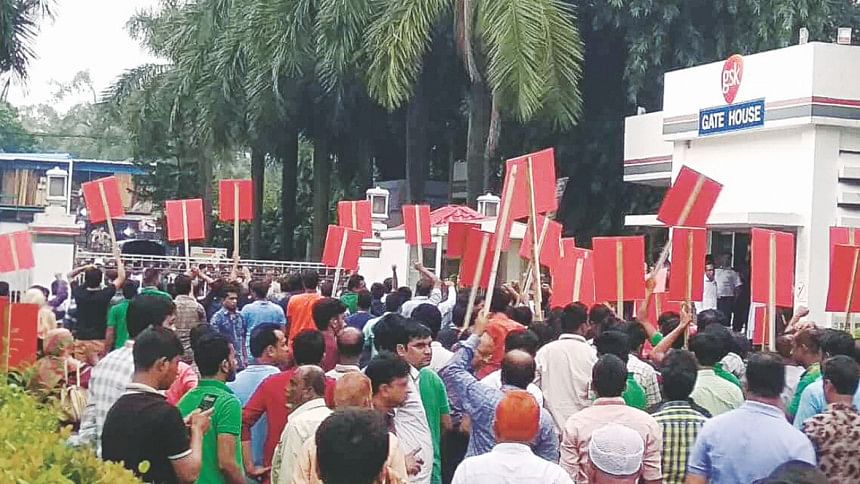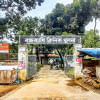GSK shuts factory after six decades

GlaxoSmithKline (GSK), one of the world's leading research-based pharmaceutical and healthcare companies, has decided to close its medicine manufacturing unit in Bangladesh after over six decades of operation.
The company made the decision at its board meeting held at a city hotel yesterday, two of its directors told The Daily Star.
The closure would affect around 1,000 people it employs at its factory in Fouzderhat of Chittagong.
GSK, however, will continue with its consumer healthcare unit that produces Horlicks, Sensodyne and Glaxose-D in Bangladesh as the company makes a healthy profit from this segment.
“There is no way that GSK Pharmaceuticals can survive in Bangladesh,” one of the directors commented.
Responding to a query about GSK's efforts to sell its pharmaceuticals unit, he said the company evaluated all options, including sale, but nothing worked.
“Who is going to buy this white elephant?” the director said. “It's a very old plant and has been incurring losses for years. Also, GSK was struggling to maintain its global standard at the factory,” said the member of the board.
The London-based pharmaceuticals giant makes vaccine solutions for Hepatitis A and B, Cervical Cancer, Chickenpox, Measles, Mumps and Rubella, Rotaviral diarrhoea, Pneumonia etc. Its portfolio includes leading brands like Engerix, Rotarix, Cervarix and Synorix.
The company also manufactures antibiotics, medicines for respiratory diseases and dermatological items. Ventolin Evohaler is a well-accepted treatment in Bangladesh. In anti-histaminic market, Piriton is still one of the top preferences.
In addition to decades-old machines in the factory, there were some other issues behind the closure, according to a top official of the company.
Some of the rival Bangladeshi companies have modern manufacturing units that produce generic medicines, the official said.
Bangladesh also imports low-cost medicines from countries like China, which poses another big challenge for GSK's business in Bangladesh, the official added.
The Daily Star contacted GSK Bangladesh's Managing Director Nakibur Rahman through the company's public relations firm for comment on the issue.
Nakibur said: “At our Q2 Business Update in July 2017, GSK announced that we will run Pharmaceuticals in our Emerging Markets region as an integrated operation, putting in place the right commercial structure in markets to deliver a sustainable growth ambition. We are unable to comment further at this time.”
Asked about the impact of GSK's decision, SM Shafiuzzaman, general secretary of Bangladesh Aushad Shilpa Samity, a forum of local pharmaceuticals companies' owners association, said it would be nothing significant.
“GSK makes medicines based on its research, but we produce generic medicines. Some local companies with their top-class plants can make the medicines GSK made in Bangladesh,” he said.
THE PLANT
About 500 employees of GSK Bangladesh demonstrated in front of the factory in Fouzderhat yesterday protesting the closure, our Chittagong office adds.
Head of the GSK's regional supply chain Raju Krishnaswami announced the permanent closure of the company's pharmaceuticals production, distribution and marketing in Bangladesh around 4:45pm, said Mohammed Ilias, president of the employees' union of GSK Bangladesh.
He told The Daily Star around 7:45pm that their leaders were in a meeting with Krishnaswami.
He said there were about 500 permanent and 500 temporary employees at the factory.
In a statement GSK Bangladesh said GSK would treat all affected employees with respect and dignity, and provide them with support during this challenging time.
Bangladesh has a very vibrant and strong local pharmaceutical industry. All of GSK's medicines are substitutable with generics and therefore patients should be able to access a range of suitable alternatives, the statement said.
According to the statement, GSK Vaccines, which are purchased via Unicef and funded by Gavi, the Vaccine Alliance, will continue to be available in Bangladesh.
GSK set up its Bangladesh production facilities in 1963. It is a publicly traded company at the Dhaka Stock Exchange since 1976.
The company yesterday disclosed its quarterly financial performances. Its earnings per share declined to Tk 3.65 in the April-June quarter, down from Tk 4.61 for the same time the previous year.
Its net asset value (NAV) per share also declined to Tk 178.49, as on June 30, 2018, down from Tk 183.93 from a year ago. The company has reserve and surplus of Tk 250.99 crore.

 For all latest news, follow The Daily Star's Google News channel.
For all latest news, follow The Daily Star's Google News channel. 








Comments